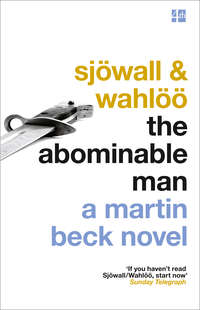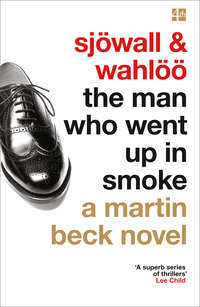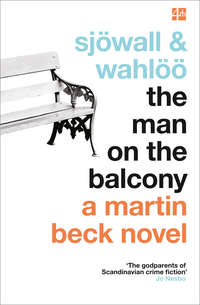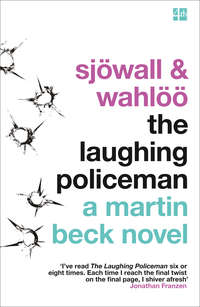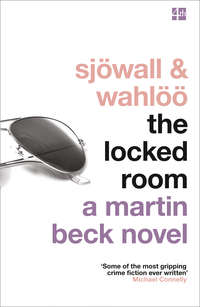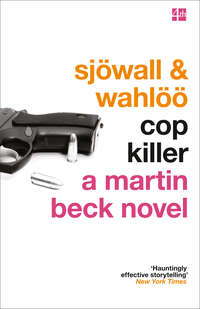
Полная версия
Roseanna
Martin Beck became conscious of the fact that he was standing with his hands clasped behind his back as he shifted his weight from the sole of one foot to another, a habit from his years as a patrolman which was totally unconscious and almost unbreakable. He was standing and staring at a grey and uninteresting piece of ground from where the chalk marks from the first, routine investigation had long since been washed away by the rain. He must have occupied himself with this for a long time because the surroundings had gone through a number of changes. When he looked up he observed a small, white passenger boat entering one of the locks at a good speed. When it passed the dredger, some twenty cameras pointed at it, and, as if to underscore the situation, the dredging foreman climbed out of his cabin and also photographed the passenger boat. Martin Beck followed the boat with his eyes as it passed the jetty and noted certain ugly details. The hull had clean lines but the mast was cut off and the original smokestack, which had surely been high and straight and beautiful, had been replaced by a strange, streamlined little tin hood. From inside the ship growled something that must have been a diesel engine. The deck was full of tourists. Nearly all of them seemed to be elderly or middle-aged and several of them wore straw hats with flowered bands.
The boat was named Juno. He remembered that Ahlberg had mentioned this name the first time they had met.
There were a lot of people on the breakwater and along the edge of the canal now. Some of them fished and others sunbathed, but most of them were chiefly occupied with watching the boat. For the first time in several hours Martin Beck found a reason to say something.
‘Does the boat always pass here at this time of day?’
‘Yes, if it comes from Stockholm. Twelve-thirty. Right. The one that goes in the other direction comes by later, just after four. They meet at Vadstena. They tie up there.’
‘There are a lot of people here, on shore, I mean.’
‘They come down to see the boat.’
‘Are there always so many?’
‘Usually.’
The man he was talking to took the pipe from his mouth and spat in the water.
‘Some pleasure,’ he said. ‘To stand and stare at a bunch of tourists.’
When Martin Beck walked back along the brink of the canal he passed the little passenger boat again. It was now about halfway up, peacefully rising in the third lock. A number of passengers had gone on land. Several of them were photographing the boat, others crowded around the kiosk on shore where they were buying postcards and plastic souvenirs which, without doubt, were made in Hong Kong.
Martin Beck couldn't really say that he was short of time so with his innate respect for government budgets he took the bus back to town instead of a taxi.
There were no newspapermen in the hotel lobby and no messages for him at the desk. He went up to his room, sat down at the table and looked out over the Square. Actually he should have gone over to the police station but he had already been there twice before lunch.
Half an hour later he telephoned Ahlberg.
‘Hi. I'm glad you called. The Public Prosecutor is here.’
‘And?’
‘He's going to hold a press conference at six o'clock. He seems worried.’
‘Oh.’
‘He would like you to be there.’
‘I'll be there.’
‘Will you bring Kollberg with you. I haven't had time to tell him yet.’
‘Where is Melander?’
‘Out with one of my boys following up a lead.’
‘Did it sound as if it could be anything important?’
‘Hell, no.’
‘And otherwise?’
‘Nothing. The Prosecutor is worried about the press. The other telephone is ringing now.’
‘So long. See you later.’
He remained seated at the table and listlessly smoked all his cigarettes. Then he looked at the clock, got up, and went out into the corridor. He stopped three doors down the hall, knocked and walked in, quietly and very quickly, in his usual manner.
Kollberg lay on the bed reading an evening paper. He had taken off his shoes and jacket and opened his shirt. His service pistol lay on the night table, wrapped up in his tie.
‘We've fallen back to page twelve today,’ he said. ‘The poor devils, they don't have an easy time of it.’
‘Who?’
‘Those reporters. “The mystery tightens around the bestial murder of the woman in Motala. Not only the local police but even the Homicide Division of the National Police are fumbling around hopelessly in the dark.” I wonder where they get all that?’
Kollberg was fat and had a nonchalant and jovial manner which caused many people to make fateful mistakes in judging him.
‘“The case seemed to be a routine one in the beginning but has become more and more complicated. The leaders of the search are uncommunicative but are working along several different lines. The naked beauty in Boren …” oh, crap!’
He looked through the rest of the article and threw the newspaper on the floor.
‘Yes, she was some beauty. A completely ordinary bowlegged woman with a big rear end and very small breasts.’
‘She had a big crotch, of course,’ said Kollberg. ‘And that was her misfortune,’ he added philosophically.
‘Have you seen her?’ Martin Beck asked.
‘Of course, haven't you?’
‘Only her pictures.’
‘Well, I've seen her,’ said Kollberg.
‘What have you been doing this afternoon?’
‘What do you think? Reports from knocking on doors. What garbage! It's insane to send out fifteen different guys all over the place. Everybody expresses themselves differently and sees things differently. Some of them write four pages about seeing a one-eyed cat and saying that the kids in a house are snot-nosed, and others write up finding three bodies and a time bomb in a few paragraphs. They even ask totally different questions.’
Martin Beck said nothing. Kollberg sighed.
‘They should have a formula,’ he said. ‘They would save four-fifths of the time.’
‘Yes.’
Martin Beck searched in his pockets.
‘As you know I don't smoke,’ said Kollberg jokingly.
‘The Public Prosecutor is holding a press conference in half an hour. He would like us to be there.’
‘Oh. That ought to be lively.’
He pointed to the newspaper and said:
‘If we questioned the reporters for once. For four days in a row that guy has written that an arrest can be expected before the end of the afternoon. And the girl looks a little bit like Anita Ekberg and a little bit like Sophia Loren.’
He sat up in bed, buttoned his shirt and began to lace his shoes.
Martin Beck walked over to the window.
‘It's going to rain any minute,’ he said.
‘Oh damn,’ Kollberg said and yawned.
‘Are you tired?’
‘I slept two hours last night. We were out in the woods in the moonlight searching for that type from St Sigfrid's.’
‘Yes, of course.’
‘Yes, of course! And after we had wandered around for seven hours in this damn tourist place someone got around to telling us that the boys back at Klara station in Stockholm got the guy in Berzelii Park the night before last.’
Kollberg finished dressing and put his pistol in place. He took a quick look at Martin Beck and said: ‘You look depressed. What is it?’
‘Nothing special.’
‘Okay, let's go. The world press is waiting.’
There were about twenty journalists in the room in which the press conference was to be held. In addition, the Public Prosecutor, the Superintendent of Police, Larsson, and a TV photographer with two spotlights were there. Ahlberg wasn't there. The Prosecutor sat behind a table and was looking thoughtfully through a folder. Several of the others were standing. There weren't enough chairs for everyone. It was noisy and everyone was talking at once. The room was crowded and the air was already unpleasant. Martin Beck, who disliked crowds, took several steps away from the others and stood with his back to the wall in the space between those who would ask the questions and those who would answer them.
After several minutes the Public Prosecutor turned to the Chief of Police and asked, loudly enough to cut through all the other noise in the room:
‘Where the devil is Ahlberg?’
Larsson grabbed the telephone and forty seconds later Ahlberg entered the room. He was red-eyed and perspiring and still in the process of getting into his jacket.
The Public Prosecutor stood up and knocked lightly on the table with his fountain pen. He was tall and well built and quite correctly dressed, but almost too elegant.
‘Gentlemen, I am pleased to see that so many of you have come to this impromptu press conference. I see representatives of all branches of media, the press, radio and television.’
He bowed slightly towards the TV photographer, who was obviously the only press person present in the room whom he could definitely identify.
‘I am also pleased to be able to say that from the outset your manner of handling this tragic and … sensitive matter has been, for the most part, correct and responsible. Unfortunately, there have been a few exceptions. Sensationalism and loose speculations do not help in such a … sensitive case as …’
Kollberg yawned and didn't even bother to put his hand in front of his mouth.
‘As you all know this case has … and I certainly do not need to point it out again, special… sensitive aspects and …’
From the opposite side of the room Ahlberg looked at Martin Beck, his pale blue eyes filled with gloomy recognition and understanding.
‘… and just these … sensitive aspects call for a particularly careful way of treating them.’
The Public Prosecutor continued to speak. Martin Beck looked over the shoulder of the reporter who sat in front of him and saw a drawing of a star on his notebook. The TV man was leaning against his tripod.
‘… and naturally I want to, no, more properly said, we neither want to nor can we hide our gratefulness for all the help in this … sensitive case. In short, we need the support of what we often call that great detective, the Public.’
Kollberg yawned again. Ahlberg looked desperately unhappy.
Martin Beck finally ventured a look at the people in the room. He knew three of the journalists, they were older and came from Stockholm. He also recognized a few others. Most of them seemed very young.
‘In addition, gentlemen, the collected information that we do have is at your disposal,’ said the Public Prosecutor and sat down.
With that he had clearly said his piece. In the beginning Larsson answered the questions. Most of them were asked by three young reporters who followed each other's questions in rapid order. Martin Beck noted that a number of newspapermen sat quietly and didn't take any notes. Their attitude towards the lack of real leads in the case seemed to show compassion and understanding. The photographers yawned. The room was already thick with cigarette smoke.
QUESTION: Why hasn't there been a real press conference before this one?
ANSWER: There haven't been many leads in this case. In addition, there are certain important facts in this case that could not be made public without hindering its solution.
QUESTION: Is an arrest immediately forthcoming?
ANSWER: It is conceivable, but from the present standpoint we cannot give you a definite answer, unfortunately.
QUESTION: Do you have any real clues in this case?
ANSWER: All we can say is that our investigations are following certain distinct lines.
(After this amazing series of half truths the Chief of Police threw a sorrowful look at the Public Prosecutor who stubbornly examined his cuticles.)
QUESTION: Criticism has been directed towards several of my colleagues. Is it the opinion of those in charge of the case that these colleagues have more or less intentionally twisted the facts?
(This question was asked by the notoriously well-known reporter whose article had made such a deep impression on Kollberg.)
ANSWER: Yes, unfortunately.
QUESTION: Isn't it more a case of the police leaving us reporters out in the cold and not giving us useful information? And deliberately leaving us to our own devices to find out whatever we can in the field?
ANSWER: Hmm.
(Several of the less talkative journalists began to show signs of displeasure.)
QUESTION: Have you identified the corpse?
(Superintendent Larsson, with a quick glance, threw the ball over to Ahlberg, sat down, and demonstratively took a cigar out of his breast pocket.)
ANSWER: No.
QUESTION: Is it possible that she is from this city or somewhere around here?
ANSWER: It doesn't seem likely.
QUESTION: Why not?
ANSWER: If that were the case we would have been able to identify her.
QUESTION: Is that your only reason for suspecting that she comes from another part of the country?
(Ahlberg looked dismally at the Chief of Police who was devoting all his attention to his cigar.)
ANSWER: Yes.
QUESTION: Has the search of the bottom near the breakwater produced any results?
ANSWER: We have found a number of things.
QUESTION: Do these things have anything to do with the crime?
ANSWER: That is not easy to answer.
QUESTION: How old was she?
ANSWER: Presumably between twenty-five and thirty.
QUESTION: Exactly how long had she been dead when she was found?
ANSWER: That isn't easy to answer, either. Between three and four days.
QUESTION: The information that has been given to the public is very vague. Isn't it possible to tell us something more exact, information which really says something?
ANSWER: That's what we are trying to do here. We have also retouched a picture of her face which you are welcome to, if you want to have it.
(Ahlberg reached for a group of papers on the desk and started to hand them out. The air in the room was heavy and humid.)
QUESTION: Did she have any particular marks on her body?
ANSWER: Not as far as we know.
QUESTION: What does that mean?
ANSWER: Simply, that she had no marks at all.
QUESTION: Has a dental examination given any special clues?
ANSWER: She had good teeth.
(A long and pressing pause followed. Martin Beck noted that the reporter in front of him was still doodling with the star he had drawn.)
QUESTION: Is it possible that the body was thrown into the water at some other place and that it was brought to the breakwater by the current?
ANSWER: It doesn't seem likely.
QUESTION: Have you learned anything by knocking on doors?
ANSWER: We are still working on that.
QUESTION: To sum up, isn't it true that the police have a complete mystery on their hands?
It was the Public Prosecutor that answered:
‘Most crimes are a mystery in the beginning.’
With that, the press conference ended.
On the way out, one of the older reporters stopped Martin Beck, laid his hand on his arm and said: ‘Don't you know anything at all?’ Martin Beck shook his head.
In Ahlberg's office two men were going through all the material they had gathered from the operation of knocking on doors.
Kollberg walked over to the desk, looked at several of the papers, and shrugged his shoulders.
Ahlberg came in. He took off his jacket and hung it over the back of his chair. Then he turned to Martin Beck and said: ‘The Public Prosecutor wants to talk to you. He is still in the other room.’
The Prosecutor and the Police Superintendent were still sitting behind the table.
‘Beck,’ said the Prosecutor, ‘I don't see that your presence is necessary here any longer. There simply is not enough work for the three of you.’
‘That's true.’
‘In general I think that a lot of what is left to do can be done conveniently somewhere else.’
‘That is possible.’
‘To put it simply, I don't want to detain you here, especially if your presence is more motivated in another direction.’
‘That is also my point of view,’ the Chief of Police added.
‘Mine also,’ said Martin Beck.
They shook hands.
In Ahlberg's office it was still very quiet. Martin Beck did not break that silence.
After a while Melander came in. He hung up his hat and nodded to the others. Then he went over to the desk, sat down at Ahlberg's typewriter, put some paper in it and knocked out a few lines. He pulled the paper out of the typewriter, signed it, and placed it in the folder on the desk.
‘Was that anything?’ asked Ahlberg.
‘No,’ said Melander.
He hadn't changed his manner since he had come in.
‘We are going home tomorrow,’ Martin Beck said.
‘Great,’ said Kollberg and yawned.
Martin Beck took a step towards the door and then turned and looked at the man at the typewriter.
‘Are you coming along to the hotel?’ he asked.
Ahlberg put his head back and looked at the ceiling. Then he got up and began to straighten his tie.
In the hotel lobby they separated from Melander.
‘I've already eaten,’ he said. ‘Good night.’
Melander was a clean-living man. In addition he was economical with his expense account and subsisted mainly on hot dogs and soft drinks when he was out on a job.
The other three went into the dining room and sat down.
‘A gin and tonic,’ said Kollberg. ‘Schweppes.’
The others ordered beef, aquavit and beer. Kollberg took his drink and finished it in three swallows. Martin Beck took out a copy of the material which had been given to the reporters and read through it.
‘Will you do me a favour,’ said Martin Beck looking at Kollberg.
‘Always ready to,’ answered Kollberg.
‘I want you to write a new description, write it for me personally. Not a report but a real description. Not a description of a corpse but of a human being. Details. How she might have looked when she was alive. There's no hurry about it.’
Kollberg sat quietly for a while.
‘I understand what you mean,’ he said. ‘By the way, our friend Ahlberg supplied the world press with an untruth today. She actually did have a birthmark, on the inside of her left thigh. Brown. It looked like a pig.’
‘We didn't see it,’ said Ahlberg.
‘I saw it,’ Kollberg said.
Before he left he said:
‘Don't worry about it. No one can see everything. Anyway, it's your murder now. Forget that you've seen me. It was only an illusion. So long.’
‘So long,’ said Ahlberg.
They ate and drank silently. A lot later and without looking up from his drink, Ahlberg said:
‘Are you planning to let this one go now?’
‘No,’ replied Martin Beck.
‘I'm not either,’ said Ahlberg. ‘Never.’
Half an hour later they separated.
When Martin Beck went up to his room he found some folded papers under his door. He opened them and immediately recognized Kollberg's orderly, easy-to-read, handwriting. Because he had known Kollberg well for a long time he wasn't at all surprised.
He undressed, washed the top of his body in cold water and put on his pyjamas. Then he put his shoes out in the corridor, laid his trousers under the mattress, turned on the night table lamp, turned off the ceiling light and got into bed.
Kollberg had written:
The following can be said about the woman who is occupying your thoughts:
1 She was (as you already know) 5 feet, 6 1/2 inches tall, had grey-blue eyes and dark brown hair. Her teeth were good and she had no scars from operations or other marks on her body with the exception of a birthmark, high up on the inside of her left thigh about an inch and a half from her groin. It was brown and about as large as a dime, but uneven and looked like a little pig. She was, according to the man who performed the autopsy (and I had to press him to tell me this on the telephone), 27 or 28 years old. She weighed about 123 pounds.
2 She was built in the following manner: Small shoulders and a very small waist, broad hips and a well developed rear end. Her measurements ought to have been approximately: 32-23-37. Thighs: heavy and long. Legs: muscular with relatively heavy calves but not fat. Her feet were in good condition with long, straight toes. No corns but heavy calluses on the soles of her feet, as if she had gone barefoot a lot and worn sandals or rubber boots a great deal of the time. She had a lot of hair on her legs, and must have been bare-legged most of the time. Condition of her legs: some defects. She was somewhat knock-kneed and seems to have walked with her toes pointed outward. She had a good deal of flesh on her body but was not fat. Slender arms. Small hands but long fingers. Shoe size was 7.
3 The suntan on her body showed: she had sunbathed in a two-piece bathing suit and worn sunglasses. She had worn thong sandals on her feet.
4 Her sex organ was well developed with a heavy growth of dark hair. Her breasts were small and slack. The nipples were large and dark brown.
5 Rather short neck. Strong features. A large mouth with full lips. Straight, thick, dark eyebrows and lighter eyelashes. Not long. Straight, short nose which was rather broad. No traces of cosmetics on her face. Fingernails and toenails hard and clipped short. No traces of nail polish.
6 In the record of the autopsy (which you have read) I place special attention on the following: She had not had a child and had never had an abortion. The murder had not been committed in connection with any conventional act (no trace of sperm). She had eaten three to five hours before she died: meat, potatoes, strawberries and milk. No traces of sickness or any organic changes. She did not smoke.
I've left a call to be awakened at six o'clock. So long.
Martin Beck read through Kollberg's observations twice before he folded the papers and laid them on his night table. Then he turned off the light and rolled over towards the wall.
It had begun to get light before he fell asleep.
6
The heat was already trembling over the asphalt when they drove away from Motala. It was early in the morning and the road lay flat and empty ahead of them. Kollberg and Melander sat in the front and Martin Beck sat in the back seat with the window down and let the breeze blow on his face. He didn't feel well and it was probably due to the coffee that he had gulped down while he was getting dressed.
‘Kollberg was driving, poorly and unevenly,’ Martin Beck thought, but for once he remained silent. Melander looked blankly out the window and bit hard on the stem of his pipe.
After they had driven silently for about three-quarters of an hour Kollberg nodded his head to the left where a lake could be seen between the trees.
‘Lake Roxen,’ he said. ‘Boren, Roxen and Glan. Believe it or not that's one of the few things I remember from school.’
The others said nothing.
They stopped at a coffee house in Linköping. Martin Beck still didn't feel well and remained in the car while the others had something to eat.
The food had put Melander in a better mood and the two men in the front seat exchanged remarks during the rest of the trip. Martin Beck still remained silent. He didn't want to talk.
When they reached Stockholm he went directly home. His wife was sitting on the balcony sunbathing. She had shorts on and when she heard the front door open she took her brassiere from the balcony railing and got up.
‘Hi,’ she said. ‘How are you?’
‘Terrible. Where are the children?’
‘They took their bikes and went off to swim. You look pale. You haven't eaten properly of course. I'll fix some breakfast for you.’
‘I'm tired,’ said Martin Beck. ‘I don't want anything to eat.’
‘But it will be ready in a second. Sit down and …’
‘I don't want any breakfast. I think I'll sleep for a while. Wake me up in an hour.’


